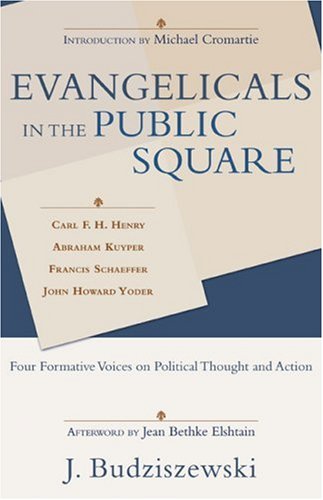A review of Evangelicals in the Public Square. Edited by J. Budziszewski.
Baker, 2006.
The role of evangelical Christianity in the public arena is a contentious and hotly debated topic. How should evangelicals engage with politics, culture and society? Should they? What are some biblical principles for the way in which faith should inform and interact with the public square?
These are some of the important questions addressed in this helpful volume. In it, J. Budziszewski, a University of Texas professor of philosophy and government brings together a group of experts to discuss such questions. They look at four major evangelicals who have carefully addressed the issue in the past century: Carl F.H. Henry (d. 2003), Abraham Kuyper (d. 1920), Francis Schaeffer (d. 1984), and John Howard Yoder (d. 1997).
In the first half of the book, Budziszewski provides an introduction to an evangelical approach to political and social involvement. It must of course be based upon Scripture. But he reminds us that Scripture does not provide an exhaustive nor complete set of instructions as to how this is to take place. He does lay out some biblical principles, but says they need to be supplemented by the natural law tradition, a favourite theme of his as found in his earlier works.


He then offers his own summary and assessment of these four influential evangelical thinkers. The second half of the book contains the thoughts of 4 experts who reflect on what Budziszewski had to say about each figure.
Henry of course is a wise choice in such a volume, as he was in many ways the dean of evangelical theologians. He founded Christianity Today and was a prophetic voice in urging the evangelical world to regain its social and political voice. He is arguably the most important American evangelical of the past century.
Abraham Kuyper was a remarkable figure in the Dutch reformed tradition. He was a newspaper editor, a founder of a university, a gifted theologian, and Prime Minister of the Netherlands. His neo-Calvinism took the form of a “principled” pluralism, which influenced many other Christian thinkers, especially in America.
Francis Schaeffer may be the best known of the four. His L’abri ministry in the Swiss Alps had a great influence on thousands, while his important writings impacted millions. He was an early Protestant culture warrior, urging fellow evangelicals to get involved in the crucial issues of the day, such as abortion.
Finally, Yoder represented the Anabaptist wing of evangelicalism, and his 1972 The Politics of Jesus was widely read and hugely influential. His call to radical discipleship, non-violence and his rejection of all forms of coercion helped many to think about Jesus in a new light.
Budziszewski and the four authors assessing these four evangelical leaders, all find strengths and weaknesses in their approaches. All four have greatly shaped and impacted contemporary evangelical thought. All have much to offer us, but none seemed to have the whole picture, or the whole answer. Their various emphases present us with much to reflect on and interact with.
Budziszewski feels that while all four made significant contributions to Christian political theory, they all underestimated the role of general revelation, and what we can learn from natural law. The four experts interact with him on this point, and the result is a lively and learned interchange of ideas.
A concluding afterward by Jean Bethke Elshtain nicely ties it all together. In her remarks she reminds us that in a fallen world, no one approach to politics will be fool-proof, and all Christian attempts to interact with society and the political order will be less than perfect, less than ideal. Thus we need to be humble in what we can expect from the political process, and our Christian understanding of it.
This is a very helpful volume addressing some important issues which have divided evangelicals and frustrated many believers. While it will not answer all questions nor solve all problems, it will shed much light on these vital issues, and help evangelicals move forward in this crucial area.
[662 words]



















